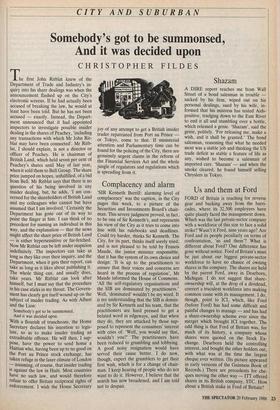CITY AND SUBURBAN
Somebody's got to be summonsed, And it was decided upon
CHRI STOPHER FILD ES
The first John Ritblat knew of the Department of Trade and Industry's in- quiry into his share dealings was when the announcement flashed up on the City's electronic screens. If he had actually been accused of breaking the law, he would at least have been told. But he has not been accused — exactly. Instead, the Depart- ment announced that it had appointed inspectors to investigate possible insider dealing in the shares of Peachey, 'including any transactions with which Mr John Rit- blat may have been connected'. Mr Ritb- lat, I should explain, is not a director or officer of Peachey. He is chairman of British Land, which held seven per cent of Peachey's shares until May of last year, when it sold them to Bell Group. The share price jumped on hopes, unfulfilled, of a bid from Bell. Mr Ritblat says that there is no question of his being involved in any insider dealing, but, he adds, 'I am con- cerned for the shareholders of British Land and my colleagues who cannot but have assumed that I am involved.' Certainly the Department has gone out of its way to point the finger at him. I can think of no precedent for naming an individual in this way, and the explanation — that the news might affect the share price of British Land — is either hypersensitive or far-fetched. Now Mr Ritblat can be left under suspicion indefinitely. The inspectors can take as long as they like over their inquiry, and the Department, when it gets their report, can take as long as it likes about publishing it. The whole thing can, and usually does, take years. Mr Ritblat can look after himself, but I must say that the procedure in his case sticks in my throat. The Govern- ment has clearly got itself wound up on the subject of insider trading. As with Albert and the Lion: Somebody's got to be summonsed,
And it was decided upon.
With a flourish of truncheons, the Home Secretary declares his intention to legis- late, so as to make insider trading an extraditable offence. He will then, I sup- pose, have the power to send home a Haitian who, having been up to no good on the Port au Prince stock exchange, has taken refuge in the laxer climate of London 7 assuming, of course, that insider trading is against the law in Haiti. Most countries have no such law, and would therefore refuse to offer Britain reciprocal rights of enforcement. I wish the Home Secretary joy of any attempt to get a British insider trader repatriated from Port au Prince or Tokyo, come to that. If ministerial attention and Parliamentary time can be found for the policing of the City, there are genuinely urgent claims in the reform of the Financial Services Act and the whole jungle of regulators and regulations which is spreading from it.


















































 Previous page
Previous page